Download
News 2012/24
Brian Wilson
Download News 2012/23 remains available here.
Having been without a broadband connection for a good deal of
the time since my last Download News and dependent on a mobile
dongle with a 1GB a month limit until my new router box arrived
to solve the problem, I haven’t been able to listen to as many
downloads as usual this fortnight. I’m particularly grateful,
therefore, to Hyperion for having sent me the Buxtehude and
Żeleński and Zarębski recordings on a memory
stick.
Another slight delay was caused by my decision to purchase,
set up and test a new DAC. After a lot of deliberation I’ve
gone for the Dragonfly – all formats catered for natively from
44.1 to 96kHz with 192kHz as an extension. Set 44.1, 48, 88.2
or 96kHz from your Control Panel (System Preferences for Mac)
and the light glows the appropriate colour to indicate the chosen
frequency. It’s a neat device – just the size of a USB memory
stick – plugs into a USB socket, and, at £215, it won’t
break the bank. First results suggest that it gives a significant
boost to the quality of the sound.
Bargain
of the Month
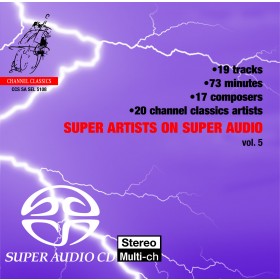 Channel
Classics are offering a number of attractive download samplers,
currently on six volumes, from their catalogue for 8 euros (£6.49)
in all formats – mp3, 24/44.1, 24/96, 24/192, DSD and SACD.
Volume 5 on SEL5108
[73:03] contains excerpts from recordings made in 2008 by the
Budapest Festival Orchestra, the Katona Twins, Pieter Wispelwey,
Rachel Podger, the Amsterdam Sinfonietta, Johanette Zomer, the
Netherlands Bach Society, Florilegium and other stars from their
catalogue. The only reason not to be tempted is the fear that
you’ll end up buying most if not all of the parent albums from
which the excerpts are taken.
Channel
Classics are offering a number of attractive download samplers,
currently on six volumes, from their catalogue for 8 euros (£6.49)
in all formats – mp3, 24/44.1, 24/96, 24/192, DSD and SACD.
Volume 5 on SEL5108
[73:03] contains excerpts from recordings made in 2008 by the
Budapest Festival Orchestra, the Katona Twins, Pieter Wispelwey,
Rachel Podger, the Amsterdam Sinfonietta, Johanette Zomer, the
Netherlands Bach Society, Florilegium and other stars from their
catalogue. The only reason not to be tempted is the fear that
you’ll end up buying most if not all of the parent albums from
which the excerpts are taken.
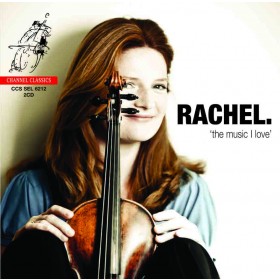 There’s
an even better bargain in the form of a 2-CD set of Rachel Podger’s
choice of over 2½ hours of her own favourite recordings
(The music I love: Channel Classics SEL6212
– mp3 £7.30 or 16-bit lossless, £8.12). There’s
plenty of Vivaldi and Bach, together with Mozart, Rameau and
Haydn. It’s only recently that I made Podger’s recording of
Vivaldi’s Op.9 concertos, La Cetra, Recording of the
Month (June 2012/1 Roundup)
and the first concerto in that set features here (track 10),
as does a concerto from La Stravanganza (track 6 – see
November 2011/1 Roundup).
Her Mozart sonata recordings with Gary Cooper (fortepiano),
another highlight of the Channel Classics catalogue, are also
represented here. The same warning applies – you’ll want at
least some of the parent recordings from the samples here.
There’s
an even better bargain in the form of a 2-CD set of Rachel Podger’s
choice of over 2½ hours of her own favourite recordings
(The music I love: Channel Classics SEL6212
– mp3 £7.30 or 16-bit lossless, £8.12). There’s
plenty of Vivaldi and Bach, together with Mozart, Rameau and
Haydn. It’s only recently that I made Podger’s recording of
Vivaldi’s Op.9 concertos, La Cetra, Recording of the
Month (June 2012/1 Roundup)
and the first concerto in that set features here (track 10),
as does a concerto from La Stravanganza (track 6 – see
November 2011/1 Roundup).
Her Mozart sonata recordings with Gary Cooper (fortepiano),
another highlight of the Channel Classics catalogue, are also
represented here. The same warning applies – you’ll want at
least some of the parent recordings from the samples here.
Don’t forget that Hyperion offer a free monthly download selection
of their releases: December 2012 is HYP201212.
Advent and
Christmas

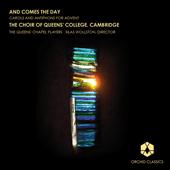 And
comes the day – Carols and Antiphons for Advent
And
comes the day – Carols and Antiphons for Advent
Queens’ College Choir Cambridge and Players
ORCHID CLASSICS ORC10027 [62:10] – from eclassical.com
(mp3 and lossless, no booklet) or stream from Naxos Music Library
(with booklet containing texts)
You’ll find full details of the contents in David Dunsmore’s
review
– here. I’m surprised to discover that this is the only Orchid
Classics recording in my collection – I had to create a new
folder for it on my external hard drive – but if its quality
is any guide, I shall be exploring the label more fully via
eclassical.com and classicsonline.com. As it is, this is some
of my favourite listening in the run-up to Christmas this year.
My only grumble about the eclassical.com download is the lack
of booklet – subscribers to Naxos Music Library can obtain it
there.

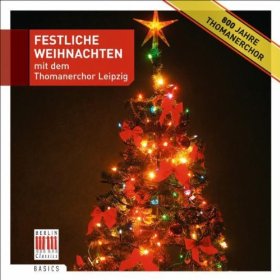 Berlin
Classics have released a 3-CD set of Christmas music from St
Thomas’s Choir Leipzig. The boys of the choir feature in
a fine set of recordings of standard German Christmas repertoire
and the whole choir under Kurt Thomas perform arias and choruses
from Bach’s Christmas Oratorio, with the likes of Dietrich
Fischer-Dieskau among the soloists. That’s two recommendable
CDs out of the three, but the third disc, of Christmas music
by Prætorius, is rather too heavy by modern standards.
(Berlin Classics 0300488BC – see my review
of the CDs). Amazon.co.uk
have this as a download for £6.49 – about half the price
of the CDs.
Berlin
Classics have released a 3-CD set of Christmas music from St
Thomas’s Choir Leipzig. The boys of the choir feature in
a fine set of recordings of standard German Christmas repertoire
and the whole choir under Kurt Thomas perform arias and choruses
from Bach’s Christmas Oratorio, with the likes of Dietrich
Fischer-Dieskau among the soloists. That’s two recommendable
CDs out of the three, but the third disc, of Christmas music
by Prætorius, is rather too heavy by modern standards.
(Berlin Classics 0300488BC – see my review
of the CDs). Amazon.co.uk
have this as a download for £6.49 – about half the price
of the CDs.

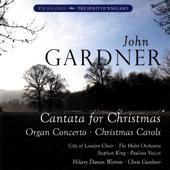 John
GARDNER’s Cantata for Christmas, Chamber Concerto
for organ and Christmas Carols on EM Records EMRCD009,
with Hilary Davan Wetton and Chris Gardner (Organ Concerto)
in charge, received a strong three-handed recommendation among
this year’s MusicWeb International Christmas reviews – details
here.
Having heard this from the Naxos Music Library – here – I can
add a fourth recommendation to that list. Download from classicsonline.com
in mp3; no texts unfortunately.
John
GARDNER’s Cantata for Christmas, Chamber Concerto
for organ and Christmas Carols on EM Records EMRCD009,
with Hilary Davan Wetton and Chris Gardner (Organ Concerto)
in charge, received a strong three-handed recommendation among
this year’s MusicWeb International Christmas reviews – details
here.
Having heard this from the Naxos Music Library – here – I can
add a fourth recommendation to that list. Download from classicsonline.com
in mp3; no texts unfortunately.

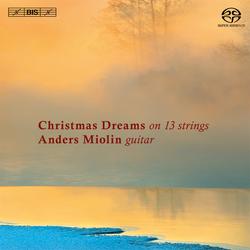 Christmas
Dreams on 13 Strings
Christmas
Dreams on 13 Strings
Fantasies on Christmas songs, composed and performed by Anders
Miolin on 13-string guitar – rec. March 2012. DSD.
Pdf booklet included.
BIS-SACD-2026 [72:18] – from eclassical.com
(mp3, 16– and 24-bit flac)
The programme contains a mix of (predominantly) the well-known
(Stille Nacht, Good King Wenceslas) and less familiar
items, all performed on the 13-string guitar. You might expect
an album with this title to sound cheesy, but two things save
it completely from that to the extent that I may well find myself
listening to Anders Miolin as an antidote to cheesiness: the
inclusion of less familiar repertoire and, more importantly,
the way in which Miolin performs the familiar items, blending
subtlety of approach with what amounts to fantasias on the music
in a blend of classical guitar and jazz improvisation – try
Noël nouvelet on track 4 if you can.

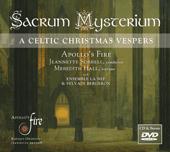 Sacrum
Mysterium – A Celtic Christmas Vespers
Sacrum
Mysterium – A Celtic Christmas Vespers
Meredith Hall (soprano)
Ensemble Le Nef/Sylvain Bergeron
Apollo’s Fire/Jeanette Sorrell (harpsichord)
rec. 12-14 December 2011, St Paul’s Church, Cleveland Heights,
Ohio
pdf booklet with texts and translations included
AVIE AV2269 [69:04] – from classicsonline.com
(mp3) or stream from Naxos Music Library.
Apart from one slightly grumpy set of comments - not on MusicWeb
- everything that I’ve read about this delightful recording
has been in agreement with my own pleasure in hearing it. That
includes David Dunsmore’s review,
where you’ll find full track-listings. With the booklet available
to download as part of the deal, the only thing you’ll be missing
is the bonus DVD that comes with the physical product.

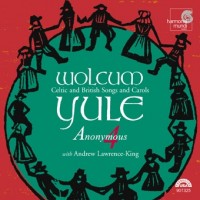 Nothing
cheesy or wallowy so far, then. Even less so is Wolcum
Yule, a selection of Celtic and British music for Christmas
stylishly sung by Anonymous 4 with Andrew Lawrence-King (harp).
The music ranges from traditional English, Scottish, Cornish
and Irish carols to Benjamin Britten, John Tavener and other
20th-century composers. (Harmonia Mundi HMU907325 – download
from emusic.com
or amazon.co.uk).
Nothing
cheesy or wallowy so far, then. Even less so is Wolcum
Yule, a selection of Celtic and British music for Christmas
stylishly sung by Anonymous 4 with Andrew Lawrence-King (harp).
The music ranges from traditional English, Scottish, Cornish
and Irish carols to Benjamin Britten, John Tavener and other
20th-century composers. (Harmonia Mundi HMU907325 – download
from emusic.com
or amazon.co.uk).
The quality of Wolcum Yule will make you want to investigate
another Anonymous 4 Christmas offering, The Cherry Tree,
which I recommended in the Christmas 2010 Roundup.

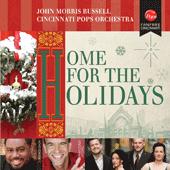 If
it’s cheesy and wallowy that you want, try Home for the
Holidays; like those bumper Christmas editions of the
comics that I used to look forward to when I was about eight,
it contains lots of your favourites in big-band arrangements.
The Cincinnati Pops conducted by John Morris Russell give it
all the full-fat treatment on their in-house label with vocal
contributions worthy of the likes of Mario Lanza – sit back
and enjoy. There’s just one problem – why is a short album,
with less than an hour’s music being charged as if it were a
double album at £13.99/$16.99? (Fanfare Cincinnati FC-001
[53:31] – from classicsonline.com
(mp3) or stream from Naxos Music Library, with pdf booklet.)
If
it’s cheesy and wallowy that you want, try Home for the
Holidays; like those bumper Christmas editions of the
comics that I used to look forward to when I was about eight,
it contains lots of your favourites in big-band arrangements.
The Cincinnati Pops conducted by John Morris Russell give it
all the full-fat treatment on their in-house label with vocal
contributions worthy of the likes of Mario Lanza – sit back
and enjoy. There’s just one problem – why is a short album,
with less than an hour’s music being charged as if it were a
double album at £13.99/$16.99? (Fanfare Cincinnati FC-001
[53:31] – from classicsonline.com
(mp3) or stream from Naxos Music Library, with pdf booklet.)

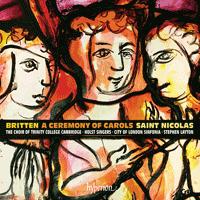 Benjamin
BRITTEN Ceremony of Carols and Saint Nicolas
Benjamin
BRITTEN Ceremony of Carols and Saint Nicolas
Trinity College Choir, Cambridge/Stephen Layton
Hyperion CDA67946 [73:17] – from hyperion-records.co.uk
(mp3 and lossless)
I passed this over too quickly when I wrote about it in the
2012/20 Download
News, saying that I couldn’t see any advantage over Hyperion’s
earlier recordings of the Ceremony (CDA66220)
and St Nicolas, the latter now on their budget Helios
label (CDH55378), so I’m grateful that Geoff Molyneux
has had a closer listen:
Ceremony of Carols is one of Britten’s works I know very
well, having conducted it many times, and I always find it a
very emotional experience to hear a fine new recording such
as this. Music Directors in Girls’ schools are glad to have
this magnificent work available to them, but I was interested
to learn that it was in fact originally conceived with female
voices in mind. So I was pleased to hear the women of Trinity
College Cambridge Choir performing here. I am so struck by the
fine musicianship displayed by all involved in this performance.
The phrasing is beautifully done, there is magnificent harp
playing and the balance is excellent.
In the opening Procession the voices may not seem as
perfectly modulated as they do in Harry Christophers’ performance
with the Sixteen on the Coro label [see below: BW], but Layton
seems rather more vibrant and alive. Also in the Layton performance,
the final note which is marked with a pause seems too short
and the resonance is not allowed to die away naturally but is
cut off by the recording engineers in mid-fade as it were, and
we rush straight into Wolcum Yole with no time to catch
our breath.
This is only a little moan however! I really liked Wolcum
Yole. Throughout this recording the dynamic range is really
very considerable, thus allowing pianissimos to be well
contrasted with the louder sections, for example in No. 8 Interlude
and in No. 9 In freezing winter night. In the latter, after
a huge fortissimo is attained, the music dies down into
the closing bars where a delicate beauty and balance is achieved
between the pianissimo chorus and harp. I am not convinced by
the extremely slow tempo adopted in No. 8 though. Listen to
Britten’s own recording with the Copenhagen Boys’ Choir from
1953 where the much faster tempo imparts a different mood here.
In fact, Britten conducts most of the pieces at a similar or
quicker tempo than Layton on this Hyperion release.
This new performance is highly polished and well worth hearing.
The performance of Saint Nicolas captures a real air
of mystery immediately from the beginning of the introduction
with fabulous orchestral playing. Allan Clayton is the excellent,
light-voiced and youthful sounding tenor soloist. He makes a
very expressive first appearance, and further on in Nicolas
devotes himself to God he captures perfectly the devotional
mood required. The chorus is excellent in tone and balance,
and every word can be heard. The Boys of the Temple Church Choir
and soloist Luke McWatters sing magnificently in The Birth
of Nicolas, and Britten’s rumbustious orchestra adds to
the excitement.
He journeys to Palestine gives the men of the chorus
a well-taken opportunity to shine and they provide a real sense
of fearful anticipation until the drama of the storm itself
is upon us. There is some magnificent music in Nicolas comes
to Myra and is chosen Bishop. Chorus, orchestra and organ rise
to the challenges and perform magnificently. The diction of
the choirs is really excellent as is demonstrated in an exhilarating
performance of Nicolas and the pickled boys.
This is a superb work full of contrasts and it brings together
all kinds of performers and, like Noye’s Fludde, accommodates
professionals, amateurs and children. There is music of great
beauty and subtlety as well as simple but hugely effective passages.
All performers and recording engineers are to be congratulated
on their superb achievement.
Geoffrey Molyneux
Several other MusicWeb International reviewers have also recommended
this new Hyperion recording highly – review:
Recording of the Month and review.
An additional recommendation – it’s one of a number of recordings
that Hyperion are offering at a reduced price in the run-up
to Christmas (CD £9.99, mp3 or flac download £5.65).

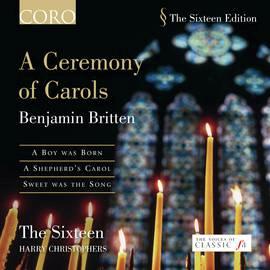 Just
in time to catch this Download News, Coro have released their
recording of Britten’s Ceremony of Carols (COR16034,
with pdf booklet and texts [69:37]) as a download in mp3, aac,
alac and flac lossless – from thesixteendigital.com.
The couplings are three carols, the Missa Brevis and
A Boy was born. At £7.99 the mp3 and aac are comparable
with the price of the Hyperion recording and the lossless versions,
at £10.00 cost a little more. I’ve already praised this
performance of the ceremony in the alternative coupling on Hodie
where it’s placed in the company of Christmas music by other
20th-century composers (COR16004 – see Christmas 2009
Roundup).
Geoff Molyneux has mentioned the high quality of the intonation
of this recording by the Sixteen in his review of the new Hyperion
(above). The recording is good but benefits from a volume boost.
Just
in time to catch this Download News, Coro have released their
recording of Britten’s Ceremony of Carols (COR16034,
with pdf booklet and texts [69:37]) as a download in mp3, aac,
alac and flac lossless – from thesixteendigital.com.
The couplings are three carols, the Missa Brevis and
A Boy was born. At £7.99 the mp3 and aac are comparable
with the price of the Hyperion recording and the lossless versions,
at £10.00 cost a little more. I’ve already praised this
performance of the ceremony in the alternative coupling on Hodie
where it’s placed in the company of Christmas music by other
20th-century composers (COR16004 – see Christmas 2009
Roundup).
Geoff Molyneux has mentioned the high quality of the intonation
of this recording by the Sixteen in his review of the new Hyperion
(above). The recording is good but benefits from a volume boost.
Also from thesixteendigital.com,
Christus natus est: an early English Christmas
(COR16027 – December 2010 Roundup)
in mp3, aac and lossless formats, the latter neatly replacing
the lossless version from passionato.com, which is no longer
available.
Naxos: the
Chairman recommends
Time didn’t allow me last month to complete my survey of the
most recent list of recommendations from the Naxos chairman.
Apart from de Almeida’s La Spinalba, which will have
to wait till the New Year, here are the rest.
Classicsonline.com are beginning to make many of their recent
downloads – not just of Naxos – available in lossless flac as
well as top-quality mp3. That means paying an extra pound or
dollar ($7.99 as against $6.99 or £5.99 against £4.99)
but that still represent a saving on the regular price of the
CDs, now no longer strictly speaking at budget price. What happened
to the early days when they could be found, randomly dumped
in a browser in Woolworths for £3.99? What happened to
Woolworths, indeed?
Ferdinand RIES (1784-1838)
Piano Concertos, Volume 5
Piano Concerto in E-flat, Op.42 [29:52]
Introduction et Rondeau brillant, Op.144 [17:52]
Piano Concerto in g minor, Op.177 [30:22]
Christopher Hinterhuber (piano)
New Zealand Symphony Orchestra/Uwe Grodd – rec. 12 – 14 September,
2011. DDD.
Pdf booklet included.
NAXOS 8.572742 [78:06] – from classicsonline.com
(mp3 and lossless) or stream from Naxos Music Library
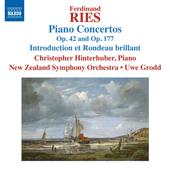 It’s
been two years since we had volumes 3 and 4 in this series –
December 2010 Download
Roundup – and once again we have a change of orchestra, though
soloist and conductor remain the same. The obvious comparison
is with Beethoven, Ries’s mentor and friend, though his music
has attractions all of its own. For all the changes of orchestra,
this series has been and remains consistently recommendable
and the recording sounds fine – though it’s available in lossless
flac, too, my review download came in mp3 only. If you haven’t
been following the series you may as well start here – and you’ll
probably be tempted to obtain some or all of the earlier volumes.
It’s
been two years since we had volumes 3 and 4 in this series –
December 2010 Download
Roundup – and once again we have a change of orchestra, though
soloist and conductor remain the same. The obvious comparison
is with Beethoven, Ries’s mentor and friend, though his music
has attractions all of its own. For all the changes of orchestra,
this series has been and remains consistently recommendable
and the recording sounds fine – though it’s available in lossless
flac, too, my review download came in mp3 only. If you haven’t
been following the series you may as well start here – and you’ll
probably be tempted to obtain some or all of the earlier volumes.
Alfredo CASELLA (1883-1947)
Introduzione, aria e toccata, Op.55 (1933) † [19:12]
Partita for piano and small orchestra, Op.42 (1924-25) * [30:14]
La donna serpente (‘The Snake-Woman’) – Opera, Op.50
(1928-31) Orchestral Fragments † [29:02]
World premiere recordings – but see below †
Sun Hee You (piano) *
Orchestra Sinfonica di Roma/Francesco La Vecchia – rec. June
and October 2011 and March 2012. DDD
Pdf booklet included
NAXOS 8.573005 [78:28] – from classicsonline.com
(mp3) or stream from Naxos Music Library
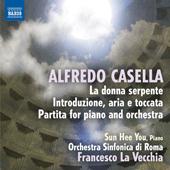 Both
Naxos and Chandos have been recording the music of Alfredo Casella;
you’ll find Dan Morgan’s review of the symphonic fragments from
La Donna Serpente, also included on this new Naxos CD
(CHAN10712), in the June 2012/1 Roundup.
Naxos claim this as a world premiere, which may well have been
true when they started putting this recording together, though
Chandos have beaten them to it by a few months.
Both
Naxos and Chandos have been recording the music of Alfredo Casella;
you’ll find Dan Morgan’s review of the symphonic fragments from
La Donna Serpente, also included on this new Naxos CD
(CHAN10712), in the June 2012/1 Roundup.
Naxos claim this as a world premiere, which may well have been
true when they started putting this recording together, though
Chandos have beaten them to it by a few months.
There’s another Casella recording, this time duplicating the
Concerto for Orchestra from the Chandos release, on Naxos
8.573004:
- Suite in C, Op. 13 (1909-1910)
[26:16]
- Pagine di guerra, Op. 25bis (version for orchestra,
1915, 1918) [11:00]
- Concerto for Orchestra, Op. 61 (1937) [32:42]
Orchestra Sinfonica di Roma/Francesco La Vecchia – rec. June,
July, October 2011. DDD
Pdf booklet included.
Dan Morgan reviewed
this too, this time in CD format on the main MusicWeb International
pages:
Music of unbridled energy, a big,
sense-sating sound and unusually detailed liner-notes add up
to a most desirable package. In short, Naxos have given us another
cracker – and it’s not even Christmas!
Well, it is almost Christmas now and both
these recordings are still well worth having. Colourful music
in bold performances, well recorded – no flac, but the mp3 is
very good.
Wolfgang RIHM (b. 1952) Complete
Works for Violin and Piano
Phantom und Eskapade – ‘Stückphantasien’
(‘Fantasy Pieces’) for violin and piano (1993/94) [18:12]
Hekton for violin and piano (1972) [6:41]
Antlitz – ‘Zeichnung’ (‘Drawing’) for violin and
piano (1992/93) [14:29]
Eine Violinsonate (1971/75) [11:02]
Über die Linie VII for solo violin (2006)* [24:41]
*world premiere recording
Tianwa Yang (violin), Nicholas Rimmer (piano) – rec 1 to 4 April,
2012. DDD.
Includes interview between Wolfgang Rihm and Dr. h.c. Hans Hachmann.
NAXOS 8.572730 [75:05] – from classicsonline.com
(mp3) or stream from Naxos Music Library
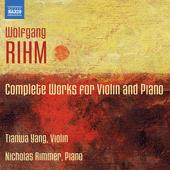 Alfredo
Casella is a composer of recent provenance of whom the musically
timid need have no fear but Wolfgang Rihm may be another kettle
of fish. This might be one to try out first, then, from Naxos
Music Library if possible, or Spotify. For me most of Rihm’s
music just falls on the right side of the dividing line between
music that’s difficult but worth getting to know – after all,
Bartók used to be only just the right side of that line
50 years ago – and music that’s out of my comfort zone. Messiaen
falls on the right side of that line – emphatically so in the
case of Turangalîla and many of his organ masterpieces
– most of the music of his former pupil Boulez on the wrong
side.
Alfredo
Casella is a composer of recent provenance of whom the musically
timid need have no fear but Wolfgang Rihm may be another kettle
of fish. This might be one to try out first, then, from Naxos
Music Library if possible, or Spotify. For me most of Rihm’s
music just falls on the right side of the dividing line between
music that’s difficult but worth getting to know – after all,
Bartók used to be only just the right side of that line
50 years ago – and music that’s out of my comfort zone. Messiaen
falls on the right side of that line – emphatically so in the
case of Turangalîla and many of his organ masterpieces
– most of the music of his former pupil Boulez on the wrong
side.
Asian Music for String Quartet
Zhou LONG (b.1953) Song of
the Ch’in (1982) [8:57]
Chinary UNG (b.1942) Spiral
III (1990) [10:01]
Gao PING (b.1970) Bright
Light and Cloud Shadows (2007) [11:33]
Toru TAKEMITSU (1930-1996)
A Way a Lone (1981) [11:50]
Tan DUN (b.1957) Eight Colors
(1986) [15:47]
New Zealand String Quartet (Helene Pohl, Douglas Beilman (violins);
Gillian Ansell (viola); Rolf Gjelsten (cello) – rec. 21– 24
July 2010. DDD.
Pdf booklet included.
NAXOS 8.572488 [58:09] – from classicsonline.com
(mp3) or stream from Naxos Music Library
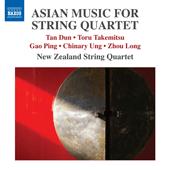 This
is another recording that you might be well advised to sample
first, though it falls more securely than the Rihm into my comfort
zone. Tan Dun’s Song of the Ch’in breathes the air of
the ‘mystic orient’ for Western listeners, while Chinary Ung’s
Spiral III seems to me to owe more to Schoenberg than
to ethnic music, though the Naxos notes refer to Cambodian æsthetics.
Gao Ping’s Bright Light and Cloud Shadows is impressionistic
in nature – but don’t think of Debussy or Ravel. Takemitsu’s
A Way a lone owes its inspiration to James Joyce’s Finnegan’s
Wake, while Tan Dun’s Eight Colors – in eight sections
with titles such as Peking Opera – which rounds off the
programme blends his evident love of his native music with the
influence of Schoenberg.
This
is another recording that you might be well advised to sample
first, though it falls more securely than the Rihm into my comfort
zone. Tan Dun’s Song of the Ch’in breathes the air of
the ‘mystic orient’ for Western listeners, while Chinary Ung’s
Spiral III seems to me to owe more to Schoenberg than
to ethnic music, though the Naxos notes refer to Cambodian æsthetics.
Gao Ping’s Bright Light and Cloud Shadows is impressionistic
in nature – but don’t think of Debussy or Ravel. Takemitsu’s
A Way a lone owes its inspiration to James Joyce’s Finnegan’s
Wake, while Tan Dun’s Eight Colors – in eight sections
with titles such as Peking Opera – which rounds off the
programme blends his evident love of his native music with the
influence of Schoenberg.
I’ve no benchmark for any of this music but the performances
sound idiomatic, the notes are helpful and the recording is
good.
***
Dieterich BUXTEHUDE
(c1637-1707) The Complete Organ Works, Vol. 5
Canzonetta in G, BuxWV171 [2:15]
Kommt her zu mir, spricht Gottes Sohn, BuxWV201 [2:37]
Præludium in C, BuxWV137 [5:42]
Vater unser im Himmelreich, BuxWV219 [2:21]
Gelobet seist du, Jesu Christ, BuxWV188 [8:12]
Jesus Christus, unser Heiland, der den Tod überwand,
BuxWV198 [1:28]
Nun lob, mein Seel, den Herren, BuxWV215 [2:15]
Es spricht der Unweisen Mund wohl, BuxWV187 [3:18]
Præludium in e minor, BuxWV143 [6:23]
Herr Christ, der einig Gottes Sohn, BuxWV192 [2:06]
Lobt Gott, ihr Christen allzugleich, BuxWV202 [1:09]
Præludium in the Phrygian mode, BuxWV152 [4:19]
Durch Adams Fall ist ganz verderbt, BuxWV183 [3:03]
Præludium in F, BuxWV144 [3:04]
Magnificat primi toni, BuxWV204 [4:17]
Fuga in G, BuxWV175 [2:59]
Nun bitten wir den heiligen Geist, BuxWV209 [2:24]
Præludium in E, BuxWV141 [7:18]
Von Gott will ich nicht lassen, BuxWV220 [2:06]
Ich dank dir, lieber Herre, BuxWV194 [4:16]
Ach Gott und Herr, BuxWV177 [2:15]
Præludium in G, BuxWV147 [3:57]
Christopher Herrick (organ) – rec. Aubertin organ of Mariager
Klosterkirke, Denmark, February 2012. DDD
Pdf booklet with organ specification and track-by-track registration
included.
HYPERION CDA67964 [77:46] – from hyperion.co.uk
(mp3, 16– and 24-bit lossless)
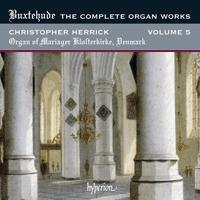 Now
that Christopher Herrick has reached Volume 5 of his Buxtehude
survey for Hyperion, we know what to expect, so this new release
is pretty well self-recommending. There used to be a let-out
clause in ‘true detective’ stories that only the names had been
changed to protect the innocent; in this case it’s the organ
that’s changed from one volume to the next. Despite the age
of the church in which it’s housed, the organ was built as recently
as 2007-2010; full details are included in the pdf booklet,
which is available to all via the link given above, so I won’t
repeat them. Suffice to say that it makes a fine instrument
for the music of Buxtehude and that Herrick never gets carried
away into overwhelming the music with his chosen registration.
Now
that Christopher Herrick has reached Volume 5 of his Buxtehude
survey for Hyperion, we know what to expect, so this new release
is pretty well self-recommending. There used to be a let-out
clause in ‘true detective’ stories that only the names had been
changed to protect the innocent; in this case it’s the organ
that’s changed from one volume to the next. Despite the age
of the church in which it’s housed, the organ was built as recently
as 2007-2010; full details are included in the pdf booklet,
which is available to all via the link given above, so I won’t
repeat them. Suffice to say that it makes a fine instrument
for the music of Buxtehude and that Herrick never gets carried
away into overwhelming the music with his chosen registration.
With excellent recording and that booklet of notes to which
I’ve referred – all fully up to the usual Hyperion standard,
this is a worthy successor to the first four volumes. As usual
there’s a good mix of free-form works and those based on Lutheran
chorale tunes. There’s nothing particularly seasonal here, but
you could do a great deal worse than to make this your Christmas
listening. If you followed my recommendation and bought the
EMI Gemini 2-CD set of Buxtehude organ music (4563292:
Lionel Rogg: Bargain of the Month – review)
one or more of the Hyperion volumes should be your next consideration.
Wolfgang Amadeus MOZART (1756-1791)
Piano Concerto No.9 in E-flat, K271, Jeunehomme [33:02]
Piano Concerto No.21 in C, K467 ‘Elvira Madigan’ [29:15]
Cleveland Orchestra/Mitsuko Uchida (piano)
DECCA 478 3539 [62:18] – from
hmvdigital.com (mp3)
The Great Piano Concertos, Volume 1
Piano Concerto No. 19 in F, K459 [27:56]
Piano Concerto No. 20 in d minor, K466 [29:56]
Rondo for Piano and Orchestra in D, K382 [10:00]
Piano Concerto No. 23 in A, K488 [25:52]
Piano Concerto No. 21 in C, K467 ‘Elvira Madigan’ [26:15]
Piano Concerto No. 24 in c minor, K491 [29:32]
Rondo for Piano and Orchestra in A, K386 [8:37]
Alfred Brendel (piano)
Academy of St Martin in the Fields/Neville Marriner
DECCA DUO 442 2692 [2 CDs: 158:08] – from hmvdigital.com
(mp3)
The Great Piano Concertos, Volume 2
Piano Concerto No. 9 in E-flat, K271, Jeunehomme[32:49]
Piano Concerto No. 15 in B-flat, K450 [32:34]
Piano Concerto No. 22 in E-flat, K482 [34:49]
Piano Concerto No. 25 in C, K503 [25:15]
Piano Concerto No. 27 in B-flat, K595 [29:13]
Alfred Brendel (piano)
Academy of St Martin in the Fields/Neville Marriner
DECCA DUO 442 5712 [2 CDs: 154:42] – from hmvdigital.com
(mp3)
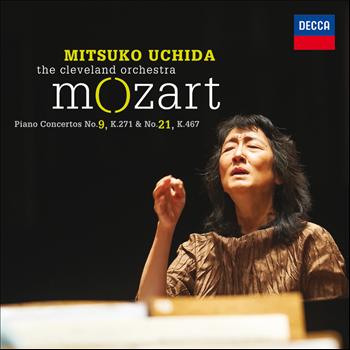 Mitsuko
Uchida is revisiting territory that she last explored almost
two decades ago in the company of Jeffrey Tate on a series of
recordings still well worth hearing and owning*. If anything,
however, her new versions, directing the Cleveland Orchestra
from the piano, excel what she achieved then. On this second
volume of her new series she gives us superlative performances
of Mozart’s earliest success in this genre and the best known
– thanks to the film Elvira Madigan, which has given
it its spurious modern title – of his later masterpieces. My
own favourite may be No.23, K488, but there’s no denying the
appeal of K467 and, for that matter, of K271, when they are
performed so very well.
Mitsuko
Uchida is revisiting territory that she last explored almost
two decades ago in the company of Jeffrey Tate on a series of
recordings still well worth hearing and owning*. If anything,
however, her new versions, directing the Cleveland Orchestra
from the piano, excel what she achieved then. On this second
volume of her new series she gives us superlative performances
of Mozart’s earliest success in this genre and the best known
– thanks to the film Elvira Madigan, which has given
it its spurious modern title – of his later masterpieces. My
own favourite may be No.23, K488, but there’s no denying the
appeal of K467 and, for that matter, of K271, when they are
performed so very well.
I’ve been listening to a recent CD of K271 on which David Greilsammer
(piano) directs L’Orchestre de Chambre de Genève in the
Jeunehomme Concerto, K271, together with the Symphony No.23,
K181, extracts from the incidental music to Thamos, König
in Ägypten and Mitridate, re di Ponte, and a
recent work by Denis Schuler (b.1970) (Sony 88725430252).
Greilsammer, whose Mozart I have praised on another recording,
gives a very good performance, albeit that the programme which
he offers is rather bitty and not helped by interspersing the
modern piece between two of the extracts from Thamos,
but it’s to Uchida and to Brendel on Decca or to his early recording,
recently reissued at budget price, that I shall return in future
for K271:
– Musical Concepts Alto ALC1047:
Alfred Brendel; Solisti di Zagreb/Antonio Janigro (with Piano
Concerto No.14; Piano Sonata No.8) Bargain of the Month
– see review
For K467 Geza Anda with the Salzburg Mozarteum
Camerata has long been my benchmark and I recently praised the
Linn 24-bit transfer of this classic recording (UNI014,
with Nos.6 and 17– Reissue of the Month: July 2012/2 Roundup).
I’m not about to abandon my loyalty to that recording when it’s
come up sounding so fresh, but Uchida gives it a very good run
for its money. I listened to her new version in 320kb/s mp3
sound which, of course, can’t compare with Linn’s 24/96 refurbishment
in wma or flac, but I don’t think that anyone other than confirmed
audiophiles would find too much wrong with the sound of the
new recording. In K271 you won’t be surprised that the new recording
outshines Brendel’s elderly Vox recording – that has come up
surprisingly well for its age but cannot help sounding thin.
That’s why I’ve also included the two Decca Duo Alfred Brendel
albums on the second of which he performs another superb
version of the Jeunehomme concerto. Both of these Duo sets,
formerly on Philips, offer splendid performances, five concertos
on each, excellently supported by the ASMF and Sir Neville Marriner,
and still sounding very well. Each can be had for around £9
on disc or for £7.49 in good mp3 sound from hmvdigtal.com
– in mercenary terms, that’s two discs for the same price as
the single Uchida CD. So many very valuable Philips Duo sets
have been deleted recently that it’s good to see these two remaining
available, albeit on the Decca label.
* No.9 with 14, 15, 17, 18 and
Rondo, K382, on Decca Duo 473 3132; Nos. 19-23 on Decca
Duo 468 5402, 2-CD sets for around £9 each or download
from hmvdigital.com for £7.49 each.
Wolfgang Amadeus
MOZART (1756-1791)
Le nozze di Figaro (1786)
Alfred Poell (baritone) – Il Conte di Almaviva
Lisa Della Casa (soprano) – La Contessa
Hilde Güden (soprano) – Susanna
Cesare Siepi (bass) – Figaro
Suzanne Danco (soprano) – Cherubino
Hilde Rössl-Majdan (contralto) – Marcellina
Fernando Corena (bass) – Bartolo
Murray Dickie (tenor) – Don Basilio
Hugo Meyer-Welfing (tenor) – Don Curzio
Anny Felbermayer (soprano) – Barbarina
Harald Pröglhof (bass) – Antonio
Wiener Staatsopernchor
Wiener Philharmoniker/Erich Kleiber – rec. Redoutensaal, Vienna,
June 1955. ADD.
No libretto
NAXOS CLASSICAL ARCHIVES 9.80427-30 [2:52:35] – from
eclassical.com
(mp3 and lossless) [not available in the USA and some other
countries]
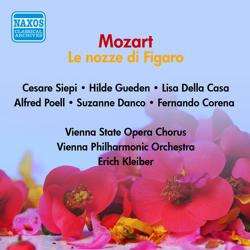 I’ve
been watching the Opus Arte blu-ray recording of the Covent
Garden Figaro conducted by Antonio Pappano (OABD7033D)
and very good it is, but it sent me back to this Kleiber recording,
still my benchmark over 50 years after I first heard it.
I’ve
been watching the Opus Arte blu-ray recording of the Covent
Garden Figaro conducted by Antonio Pappano (OABD7033D)
and very good it is, but it sent me back to this Kleiber recording,
still my benchmark over 50 years after I first heard it.
Some time ago I reviewed the emusic.com mp3 download of a rival
transfer from Past Classics. That sounds quite well and it’s
very inexpensive, but the eclassical.com download in lossless
flac is much better; you still wouldn’t mistake this for a recent
recording but the sound is much fuller. Here’s the rub, however:
that emusic.com download can be yours for £2.10; from
the same source the Naxos Classical Archives download costs
£3.78 and from classicsonline.com in 320kb/s £7.96.
The eclassical.com (mp3 and flac) will cost you $31.07. As with
the Fistoulari Sleeping Beauty which I recommended in
the previous Download News, I think the extra openness and depth
of sound make the outlay worthwhile, but you should be aware
that the Decca Heritage Masters CDs, taken from the master tapes,
remain available for around £12 in the UK (478 1720
– review).
Richard WAGNER (1813-1883)
Die Meistersinger von Nürnberg [253:15]
Walther – Robert Dean Smith (tenor)
Eva – Edith Haller (soprano)
Magdalene – Michelle Breedt (mezzo)
David – Peter Sonn (tenor)
Pogner – Georg Zeppenfeld (bass)
Beckmesser – Dietrich Henschel (baritone)
Hans Sachs – Albert Dohmen (bass-baritone)
Rundfunk-Sinfonieorchester Berlin, Rundfunkchor Berlin/Marek
Janowski
rec. live, in concert, Berlin Philharmonie, 3 June 2011. DSD.
Pdf booklet included
PENTATONE PTC5186402 [4 CDs: 79:54 + 67:25 + 58:34 +
47:22] – from eclassical.com
(mp3 and lossless)
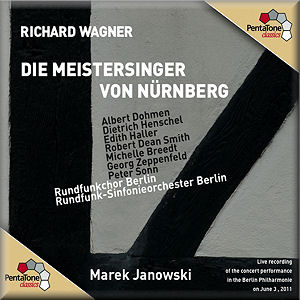 When
I praised the Janowski Parsifal some time ago I promised to
return to some of his other Wagner recordings. Christmas may
not be the right time for an opera celebrating Midsummer – but
perhaps we need something like Die Meistersinger to help
us get over our Seasonal Affective Disorder; nothing is better
guaranteed to make you feel less SAD.
When
I praised the Janowski Parsifal some time ago I promised to
return to some of his other Wagner recordings. Christmas may
not be the right time for an opera celebrating Midsummer – but
perhaps we need something like Die Meistersinger to help
us get over our Seasonal Affective Disorder; nothing is better
guaranteed to make you feel less SAD.
This recording has had a generally very favourable reception.
Simon Thompson enjoyed many aspects of it – review
– though he thought it inferior to Solti, Karajan, Sawallisch
and Kubelík. Well, Karajan in particular is my benchmark
for Meistersinger, with much to be said in favour of
both his mono and stereo recordings. The 1951 mono version with
Schwarzkopf, Edelman, Kunz and Hopf can be obtained very inexpensively
(£2.10) in a Past Classics transfer from emusic.com but
the recording requires a good deal of tolerance. Just play the
prelude immediately after the PentaTone lossless download and
the sound is very ragged indeed and yet the vigour of Karajan’s
direction shines through; though he takes a minute longer in
total, the overall impression is of greater vigour than from
Janowski.
Both classicsonline.com and eclassical.com offer the Naxos Historical
transfer of this recording but sampling suggests that it doesn’t
improve all that much sound-wise; the Documents transfer, available
from hmvdigital.com
for £7.99 sounds the best of all that I sampled. Sainsburysentertainment.co.uk
are offering a 320kb/s download of the stereo Karajan recording
for £10.99 and of the Sawallisch (also EMI) for £13.99.
I enjoyed the Janowski performance – rather more than Simon
Thompson. Ultimately, there’s a little more life in either of
the Karajan versions, so it’s to one of them that I shall most
often return, even despite the limited sound of the 1951 recording.
That said, I shall certainly not be jettisoning Janowski. What
I’ve seen in some quarters described as its virtue – a refusal
to exaggerate the swagger – can also be regarded as its Achilles
heel; I’d have liked just a little more of that swagger.
On the other hand the singing is the great virtue of the set.
The opera stands or falls by its Hans Sachs and in this case
Albert Dohmen ensures that it stands and he is well supported.
In my Beckmesser role I found my slate remarkably clear of negatives.
Though this was a live performance, there’s remarkably little
in the way of noises off.
The PentaTone recording sounds very well in the eclassical.com
lossless transfer, available at the same price as the mp3. If,
however, you are happy with 320kb/s mp3 or m4a this set is available
for a most inexpensive £7.99 from hmvdigital.com,
albeit without the booklet that comes from eclassical.com. That
pdf booklet is of dubious value; it’s a cut-down affair with
track-listings, summary and notes but no libretto; you’ll find
that online courtesy of Naxos here.
Anton BRUCKNER (1824-1896) Symphony
No. 7 in E (1881-3) [60:00]
Allegro moderato [19:18]
Adagio: Sehr feierlich und sehr langsam [19:09]
Scherzo: Sehr schnell – Trio: Etwas langsamer [9:33]
Finale: Bewegt, doch nicht schnell [12:00]
BBC Scottish Symphony Orchestra/Donald Runnicles – rec. May
2012. DDD.
HYPERION CDA67916 [60:00] – from hyperion-records.co.uk
(mp3, 16– and 24-bit lossless)
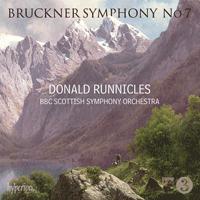 I’ve
listed the times for each movement of this recording because
Donald Runnicles takes each one of them a little faster than
is usual. By the end he has shaved over five minutes off the
time taken by Marek Janowski (PentaTone – review
and August 2011/2 Download
Roundup: Joint Download of the Month), six
minutes off Herbert von Karajan’s time with the VPO (DG Karajan
Gold* – also August 2011/2 Download
Roundup: Joint Download of the Month) and
more than 8 minutes off Karajan’s EMI recording (download for
£4.99 from sainsburysentertainment.co.uk).
Of the versions which I know only Günter Wand with the
Cologne Radio SO and the NDR SO (both RCA) comes close at just
over four minutes longer than Runnicles. Sir Roger Norrington
in his controversial recording for Hänssler skates through
the work in 55 minutes; I haven’t heard that version but it
looks dangerously fast on paper.
I’ve
listed the times for each movement of this recording because
Donald Runnicles takes each one of them a little faster than
is usual. By the end he has shaved over five minutes off the
time taken by Marek Janowski (PentaTone – review
and August 2011/2 Download
Roundup: Joint Download of the Month), six
minutes off Herbert von Karajan’s time with the VPO (DG Karajan
Gold* – also August 2011/2 Download
Roundup: Joint Download of the Month) and
more than 8 minutes off Karajan’s EMI recording (download for
£4.99 from sainsburysentertainment.co.uk).
Of the versions which I know only Günter Wand with the
Cologne Radio SO and the NDR SO (both RCA) comes close at just
over four minutes longer than Runnicles. Sir Roger Norrington
in his controversial recording for Hänssler skates through
the work in 55 minutes; I haven’t heard that version but it
looks dangerously fast on paper.
When I made the VPO/Karajan and the Janowski my joint Download
of the Month the main criterion I used was that with
neither of them did one feel jaded at the umpteenth repetition
of the theme that you heard what seemed like half an hour ago
– unless you are a confirmed anti-Brucknerite, in which case
you shouldn’t be reading this review.
How does Runnicles fare on this criterion? On the face of it,
by moving each movement along a little faster than other conductors,
he should emerge victorious, but the opposite danger is to appear
too superficial. In fact Runnicles skirts around that Scylla
and Charybdis neatly and if, ultimately, I continue to prefer
Karajan (both BPO/EMI and VPO/DG) and Janowski, I’d be perfectly
happy with the new Hyperion. At one or two points in the long
adagio I felt the tension waver slightly but Runnicles
and his team always came back strongly before the reservations
had set in.
In one important respect I prefer the new recording; I listened
to both the ‘ordinary’ CD-quality 16-bit and the 24-bit downloads
and thought them both very good, though the 24-bit opens out
the sound a little more and is worth Hyperion’s reasonable price
of £10.50 as against £6.99 for mp3 or 16-bit flac.
Both are superior to the mp3 version of the DG Karajan, good
as that is. If you like to burn your music to CDR, you’ll have
to be content with 16-bit; at 1.02GB the Hyperion 24-bit is
too large unless you can burn audio DVDs.
The booklet is full of good things except that nowhere are we
told which version of the symphony is recorded; I presume that
it’s the 1885 revision, though the percussion which Haas removed
in his edition is included.
I haven’t had time to revisit Klemperer’s recording of this
symphony but fans will be interested to note that EMI Classics
have recently reissued his recordings of Symphonies 4-9 in a
budget-price box, 6 CDs (4042962) which I’ve seen on
offer for as little as £16.50 – stream from Naxos Music
Library or download from hmvdigital.com
for £10.49. I’ve yet to hear a version of No.6 to beat
Klemperer. Bargain hunters should also note that Eugen Jochum’s
EMI recordings remain available in a box set from Brilliant
Classics for around £20 – his DG recordings, for which
I own to retaining a soft spot, are rather more expensive at
around £42 for the box (download from hmvdigital.com
for £28.99).
* Ignore the passionato.com link
– they are no longer in the download business: hmvdigital.com
have this in 320kb/s mp3 for £7.49.
Camille SAINT-SAËNS
(1835-1921)
Symphony No. 3 in C minor, Op.78 Organ Symphony* [34:24]
Bacchanale from Samson et Dalila [7:15]
Prélude to Le Déluge Op.45 [7:36]
Danse macabre, Op.40 [6:51]
Gaston Litaize (organ)*
Chicago Symphony Orchestra*; Orchestre de Paris/Daniel Barenboim
– rec. 1976 (Symphony). ADD
LINN/UNIVERSAL UNI071 [56:04] – from linnrecords.com
(mp3, 16– and 24-bit lossless)
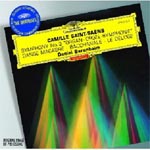 I’m
pleased that Dan Morgan has been able to listen to this recording
and to add to the very short mention that I made of it in the
last Download News:
I’m
pleased that Dan Morgan has been able to listen to this recording
and to add to the very short mention that I made of it in the
last Download News:
Regular readers will know just how much I’ve enjoyed many of
the high-res Studio Masters from Universal. Indeed, the classic
Solti Mahler 8 and Davis’s Symphonie fantastique are
among the finest downloads I’ve heard. Those were demo discs
in the LP era, as was Barenboim’s celebrated account of Saint-Saëns’s
Organ Symphony. Indeed, the latter was one of my first LPs,
the striking cover art as much of a draw as the music itself.
Dubbing in the mighty organ of Chartres Cathedral was something
of a gimmick, but as the agitated woofers of my modest student-funded
system attested it paid off in terms of sheer thrill and excitement.
I’m pleased to say the organ doesn’t disappoint here either,
the instrument’s first entry as full and warm as one could wish
for. Anyone who’s heard this work in the concert hall will know
that balances are problematic; there, and on record, the organ
usually swamps the orchestra, but the DG engineers really got
it right with this one. What a pity, then, that the orchestral
sound has a wiry treble that I don’t remember from the LP. The
extra clarity of this high-res download pays dividends in terms
of inner detail though, as I heard rather more of it here than
I did on vinyl.
Barenboim’s tempi are generally well judged and the Chicagoans
play well for him. Those plucked strings are tautly done, and
there’s a surging lyricism here that I most certainly do recall
from the record. Hiss, although present, is not at all distracting,
and I relived the frisson I used to feel at the end of the Poco
adagio. This gorgeous, refulgent organ sound is a wonderful
reminder of analogue’s last gleaming. The more excitable Allegro
moderato may be a tad bright, but it’s bearable; also, the
oft-hidden piano is easily discerned. The timps aren’t quite
as imposing as I remember, but that matters less when Barenboim
keeps it all moving so well.
That impassioned organ entry at the start of the Maestoso
– Allegro is a real tummy-wobbler, even if tension slackens
slightly thereafter. That said, Barenboim whips his orchestra
into a veritable frenzy as the work sails majestically to a
close. What a grand finale it is; the cymbals, timps and organ
as overwhelming as ever. Although this forensic re-mastering
exposes some orchestral untidiness and makes it clear just how
close the original recording came to overload, it’s still a
remarkable achievement.
The three fillers, recorded with the Paris band, are no less
attractive. The now sinuous, now febrile Bacchanale is
tautly controlled and played with astonishing crispness and
clarity. Others may find more atmosphere here, but few are as,
well, bacchanalian as Barenboim. Again, some listeners may want
to tame the treble slightly. The Prélude to Le
Déluge is altogether weightier, but Barenboim makes
the most of its abiding inwardness and violin-drenched lyricism.
It’s a lovely snippet, hauntingly done. That other pot-boiler,
the Danse macabre, is perhaps the least memorable performance
here. It’s well played and recorded, but it’s just a little
under-characterised for my tastes.
This Studio Master isn’t the equal of that Symphonie fantastique,
but then I always preferred Philips’ analogue sound to DG’s
from the same period. Make no mistake, this is a terrific issue,
and with a bit of knob-tweaking it will bring much pleasure
– and a touch of nostalgia, too.
Dan Morgan
http://twitter.com/mahlerei
Antonín DVOŘÁK
(1841-1904) Cello Concerto No.2 in b minor, Op.104, B191
[42:37]
Victor HERBERT (1859-1924)
Cello Concerto No.2 in e minor, Op.30 [22:15]
Gautier Capuçon (cello);
Frankfurt Radio Symphony Orchestra/Paavo Järvi
VIRGIN CLASSICS 5190352 [64:52] – from sainsburysentertainment.co.uk
(mp3) or stream from Naxos Music Library
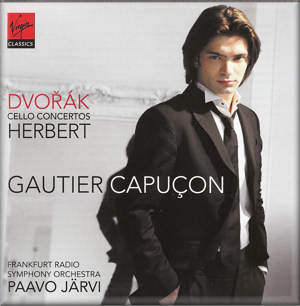
Dvořák was influenced in writing the better-known of his
two cello concertos, during his stay in the USA, by Victor Herbert,
music professor and cello virtuoso and especially by the latter’s
own second concerto. This is therefore an entirely appropriate
coupling. As the performances are very good – I liked the Dvořák
better than did Jonathan Woolf (review)
– and the mp3 sound is very acceptable, this download deserves
a strong recommendation. I’ve given a link to the least expensive
source for the download in full 320kb/s mp3 sound at £6.99;
hmvdigital.com charge £7.99.
Sergei RACHMANINOV (1873-1943)
The Isle of the Dead, Op.29 (1909) [20:21]
Symphony in d minor (Youth Symphony ed. Paul Lamm) (1891) [10:18]
Symphony No.1 in d minor, Op. 13 (1895) [43:37]
BBC Philharmonic/Gianandrea Noseda – rec. January 2008. DDD.
Pdf booklet included
CHANDOS CHAN10475 [74:39] – from theclassicalshop.net
(mp3, 16– and 24-bit lossless)
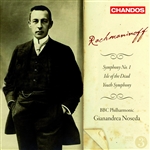 This
recording offers a version of Isle of the Dead to compete
with those that I reviewed in the last Download News. There’s
also a version of the First Symphony to count with the classic
Ormandy version (CBS) from which I got to know the work. Add
to these an account of the Tchaikovsky-influenced Youth Symphony
that makes me wish that Rachmaninov had not cast it aside.
This
recording offers a version of Isle of the Dead to compete
with those that I reviewed in the last Download News. There’s
also a version of the First Symphony to count with the classic
Ormandy version (CBS) from which I got to know the work. Add
to these an account of the Tchaikovsky-influenced Youth Symphony
that makes me wish that Rachmaninov had not cast it aside.
The lossless recording – 16– and 24-bit – is very good. I’m
not sure why I downloaded only the 16-bit version, but it sounds
fine. With excellent notes, too, this is a strong contender
if the coupling appeals.
If you have been experiencing problems downloading Chandos recordings
recently – their DL manager had become incompatible with the
latest version of Java – their new version now comes to the
rescue.
Wladyslaw ŻELEŃSKI
(1837-1921) Piano Quartet in c minor, Op.61 [36:19]
Juliusz ZARĘBSKI (1854-1885)
Piano Quintet in g minor, Op.34 (1885, pub.1931) [34:47]
Jonathan Plowright (piano)
Szymanowski Quartet (Andrej Bielow (violin, Quintet only); Grzegorz
Kotów (violin); Vladimir Mykyta (viola); Marcin Sieniaswki
(cello)) – rec. December 2011. DDD.
HYPERION CDA67905 [71:30] – from hyperion.co.uk
(mp3, 16– and 24-bit lossless)
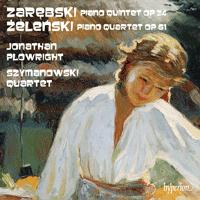 One
thing that these two composers have in common – apart from the
number of letters in their names with diacritic marks, which
will mean that I’ll have to search for the right codes when
converting this Download News to html; apologies in advance
if I get it wrong – is the warm romanticism of these two works.
The second is that, though highly regarded in their native Poland,
their music has been little known generally.
One
thing that these two composers have in common – apart from the
number of letters in their names with diacritic marks, which
will mean that I’ll have to search for the right codes when
converting this Download News to html; apologies in advance
if I get it wrong – is the warm romanticism of these two works.
The second is that, though highly regarded in their native Poland,
their music has been little known generally.
I can’t say that we’ve missed out heretofore on two masterpieces,
but I can say that both works are enjoyable and passionately
intense, that the performances and (24-bit) recording do them
full justice and that Adrian Thomas’s notes – excellent as always
from Hyperion – will help fill in the background details admirably;
there’s even help with pronunciation but not, as far as I can
see, the date of the Żeleński Piano Quartet. I make
that 19+/20 then, all round.
Karl Amadeus HARTMANN (1905-1963)
Concerto funèbre for violin and string orchestra*
(1939, rev.1959) [21:48]
Suite No.1 for solo violin (1927) [19:54]
Suite No.2 for solo violin (1927) [9:34]
Sonata No.1 for solo violin (1927) [14:14]
Sonata No.2 for solo violin (1927) [14:58]
Britten Sinfonia*/Alina Ibragimova (violin) – rec. November
2006 and January 2007. DDD.
HYPERION CDA67547 [80:48] – from hyperion-records.co.uk
(mp3 and lossless)
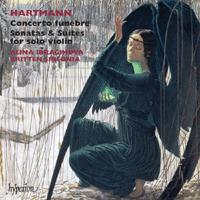 [‘An
impressive addition to the Hartmann discography’ – see review
by Jonathan Woolf]
[‘An
impressive addition to the Hartmann discography’ – see review
by Jonathan Woolf]
Hartmann’s Violin Concerto is one of the most powerful works
of the 20th century; I first encountered it on a recording by
Thomas Zehetmair, still available on Warner Apex, coupled with
the Berg and Janá?ek concertos. If I prefer Zehetmair
it’s only because I prefer the couplings to the solo violin
works, but you may already have the Berg and Janácek
in other versions. Alina Ibragimova and the Britten Sinfonia
give a powerful performance of this powerful music, well recorded
and with Hyperion’s usual high-quality booklet of notes.
As You Like It: Shakespeare Songs
Franz SCHUBERT (1797-1828) Hörch,
hörch, die Lerch’ (Hark, hark, the lark) [1:34]
Roger QUILTER (1877-1953)
Three Shakespeare Songs, Op. 6:
Come away, death [2:37]
O mistress mine [1:24]
Blow, blow, thou winter wind [2:20]
Benjamin BRITTEN (1913-1976)
Fancie [0:52]
Francis POULENC (1899-1963)
Fancy [1:50]
Ernest CHAUSSON (1855-1899)
Trois chansons de Shakespeare, Op. 28:
Chanson de clown [3:29]
Chanson d’amour [2:11]
Chanson d’Ophélie [2:03]
Franz SCHUBERT An Sylvia
[2:44]
Henry PURCELL (1659-1695) (arr.
Tippett/Bergmann) If music be the food of love [2:03]
An Epithalamium [2:51]
Michael TIPPETT (1905-1998)
Songs for Ariel:
Come unto these yellow sands [1:48]
Full fathom five [1:45]
Where the bee sucks [1:17]
Joseph HAYDN (1732-1809)
She never told her love [3:21]
Franz SCHUBERT Trinklied
[0:45]
Hugo WOLF (1860-1903) Lied
des transferierten Zettel [0:56]
Geoffrey BUSH (1920-1988) It
was a lover and his lass [1:52]
Alex WOOLF (b. 1995) Three
Tempestuous Tunes (2012) *
This is a very scurvy tune [2:08]
Flout ’em and scout ’em [0:35]
No more dams I’ll make for fish [1:10]
Dominick ARGENTO (b. 1927)
from Six Elizabethan Songs:
Winter [1:34]
Dirge [3:54]
Mervyn HORDER (1910-1998)
Under the greenwood tree [1:22]
John DANKWORTH (1927-2010)
Shall I compare thee to a summer’s day? [2:24]
The Compleat Works [1:20]
Dunsinane Blues [2:56]
Peter DICKINSON (b. 1934) from
Schubert in Blue: Hark, hark, the lark [1:55]
* world premiere recording
Nicky Spence (tenor)
Malcolm Martineau (piano) – rec. September 2012. DDD.
Pdf booklet with texts included
RESONUS CLASSICS RES10116 [57:17] – from resonusclassics.com
(mp3, aac and lossless) or stream from Naxos Music Library
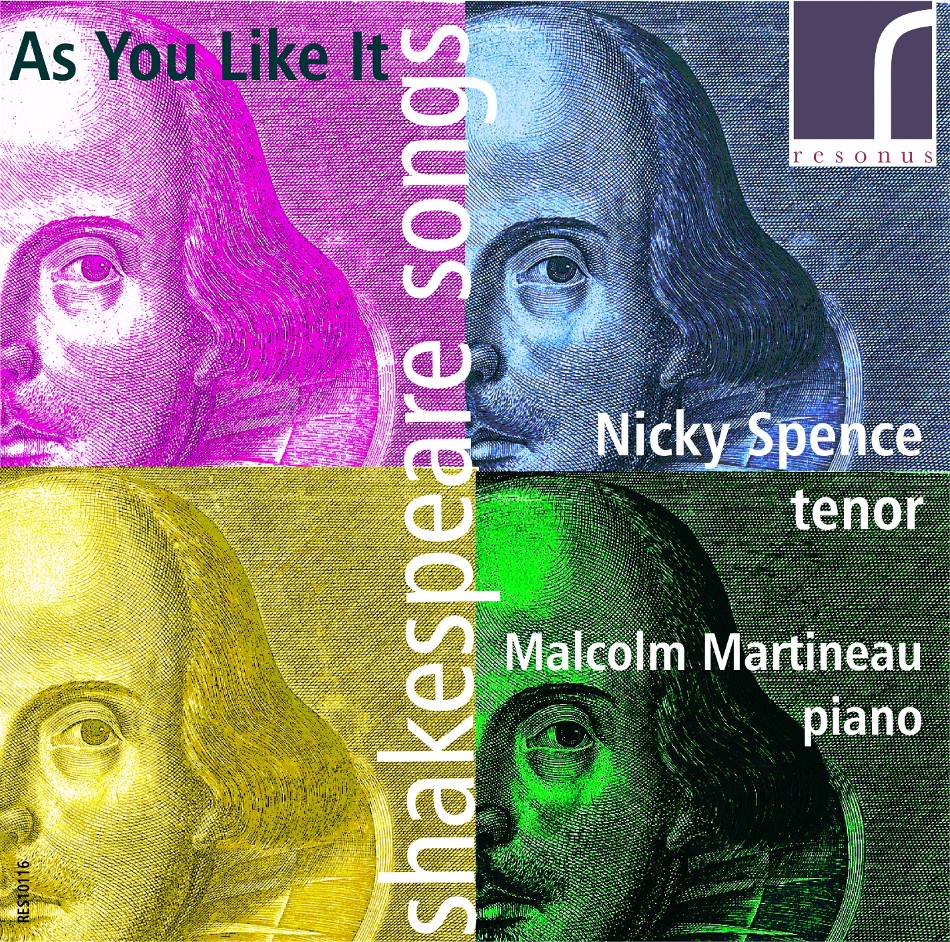 Shakespeare
must have inspired more music than any other playwright, from
the large-scale such as Prokofiev’s Romeo and Juliet to the
smaller works for voice and piano recorded here. With the exception
of the three songs by Alex Woolf much of this repertoire is
available, often in multiple recordings, but I can’t think of
any collection comparable with this. As usual, in a pattern
established with their first release, the original 1825 version
of Mendelssohn’s Octet, Resonus are filling a niche and filling
it very well. Who else would have given us Schubert’s Shakespeare,
opening with his well-known setting of Hark, hark the lark,
and closing with Peter Dickinson’s entertaining Scott Joplin-like
take on Schubert’s setting. There’s a large variety of periods
of composition and of moods here.
Shakespeare
must have inspired more music than any other playwright, from
the large-scale such as Prokofiev’s Romeo and Juliet to the
smaller works for voice and piano recorded here. With the exception
of the three songs by Alex Woolf much of this repertoire is
available, often in multiple recordings, but I can’t think of
any collection comparable with this. As usual, in a pattern
established with their first release, the original 1825 version
of Mendelssohn’s Octet, Resonus are filling a niche and filling
it very well. Who else would have given us Schubert’s Shakespeare,
opening with his well-known setting of Hark, hark the lark,
and closing with Peter Dickinson’s entertaining Scott Joplin-like
take on Schubert’s setting. There’s a large variety of periods
of composition and of moods here.
Nicky Spence has already featured on Resonus, in the music of
Mark Anthony Turnage (RES10106 – January 2012/1 Roundup);
I liked his contribution to that album and I enjoyed his performances
here, expertly partnered by Malcolm Martineau and well recorded.
In brief
I’ve just been so bowled over by a new recording of Handel’s
Organ Concertos by Lorenzo Ghielmi and La Divina Armonia
(Passacaille 990 – download from
amazon.co.uk) that I find myself preferring these recordings
of The Cuckoo and the Nightingale (HWV295), HWV296, 343b,
304 and 310) plus the Oboe Concerto, HWV287, to the Simon Preston
recording on DG Archiv. Only HWV310 (alias Op.7/5) overlaps
with the recording of the concertos from Op.4 and Op.7 which
Paul Nicholson made with the Brandenburg Consort and Goodman
(Hyperion 2-for-1 Dyad CDD22052 – mp3 and lossless from
hyperion-records.co.uk),
so the two recordings are effectively complementary. Look out
for my review of the Passacaille recording on the main MusicWeb
International review pages, but you needn’t wait to obtain the
stylish Hyperion recordings – two CDs for £7.99 as downloads,
complete with pdf booklet.
I was slightly less impressed with a Channel Classics SACD of
Joseph Haydn’s two Horn Concertos and music by
his brother Michael (CCSSA30210 [55:00]) in another review
which should be appearing on the main MusicWeb International
pages shortly, but there’s no denying the high quality of the
SACD recording – and it’s also available in a range of download
formats, from mp3, via 24/44.1, 24/96 and 24/192 up to DSD from
channelclassics.com.
I don’t think that Volume Two of Toccata’s complete keyboard
works of Rameau has yet appeared as a download except
from
toccataclassics.com – it should also be available soon from
classicsonline.com and others – but this CD from Stephen Gutman
has joined his Volume 1 – review
– in persuading me that Rameau can be made to sound well on
the piano. (TOCC0051 [75:34]). That’s quite a feat when
I normally dislike baroque keyboard music on the modern instrument,
so Gutman joins a very small company, headed by Angela Hewitt.
My review of the CD will be appearing on the main MusicWeb International
pages soon.












